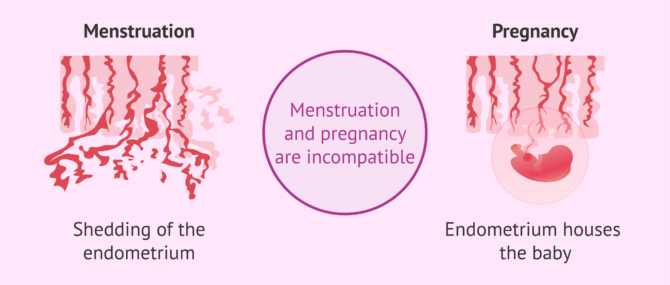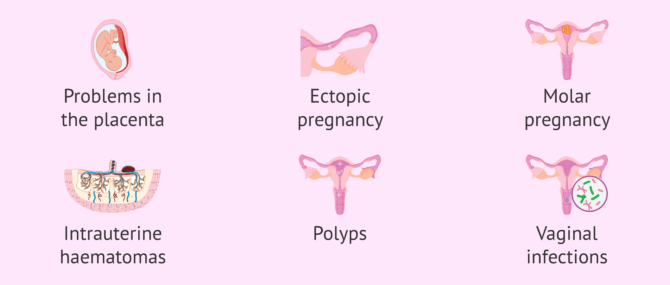Many women wonder if they can get their period while pregnant. It is common for this question to arise, as spotting or bleeding may occur at different times during pregnancy. Although it is generally not serious to have a small bleed, it is advisable to consult a specialist in case it could be an indication of a problem in the pregnancy.
It is not possible to be pregnant and have menstruation at the same time, although it is common to experience a small amount of vaginal bleeding that has nothing to do with menstrual periods.
About 30% of women experience blood loss during pregnancy, especially in the first trimester, although it is not uncommon at other times either. In fact, approximately one in 200 pregnant women also experience vaginal bleeding in the second and third trimester.
Provided below is an index with the 7 points we are going to expand on in this article.
- 1.
- 2.
- 3.
- 4.
- 4.1.
- 4.2.
- 4.3.
- 4.4.
- 5.
- 6.
- 7.
Why is there no menstruation during pregnancy?
Menstruation is the shedding of the endometrium, that is, the process by which the endometrium detaches from the uterine walls when the ovum has not been fertilized.
The brain sends hormonal signals to the ovary so that, if the eggs is fertilized and then the embyro implants, the uterine endometrium does not detach and develops properly to house, nourish and protect the baby. For this reason, there is no shedding of the endometrium during pregnancy, that is to say there is no menstruation.
If normal menstrual periods were to occur, it would mean that the woman would discard the uterine membrane responsible for nourishing the baby. Therefore, the baby would not be able to develop and the pregnancy would be lost.
You can find out what the endometrium is and its role in pregnancy in this link: What is the endometrium?.
Is it normal to bleed during pregnancy?
Although menstruation during pregnancy is not possible, many women experience vaginal bleeding during pregnancy, especially towards the start. This is called decidual bleeding.
This is usually vaginal blood loss caused by the hormonal imbalance characteristic of pregnancy. They do not normally pose a danger to the baby or the mother.
Spotting and light bleeds are common in the following physiological processes during pregnancy:
- Implantation of the embryo: it is common for implantation bleeding to occur during the first weeks of pregnancy, usually before the delay in menstruation. It is caused by the rupture of blood vessels neeeded so that the vessel connection between the mother and the baby, which will be the future placenta, can begin to form.
- Changes in the cervix: to prepare the way for the birthing process, more blood flows into the cervix and some minor bleeding is common.
However, if the bleeding becomes heavy and painful, it is recommended to see a gynecologist, as this is indicative of serious complications that can lead to miscarriage.
Other causes of bleeding in pregnancy
Normally, small amounts of spotting are caused by the normal physiological development of pregnancy. However, there are occasions when bleeding can become dangerous and could mean a threatened miscarriage.
Below are some pregnancy complications that can lead to severe bleeding:
- Problems with the placenta: such as placental abruption or placenta previa.
- Ectopic pregnancyectopic pregnancy: occurs when the embryo has implanted outside the uterine cavity, for example in the fallopian tubes, which may rupture, causing internal bleeding.
- Molar pregnancymolar pregnancy: This is a malformation of the placental tissue that may cause genital bleeding.
- Intrauterine hematomasare crescent-shaped structures formed by the appearance of small pools of blood between the chorionic tissue and the superficial layers of the endometrium. When these hematomas appear, the pregnancy is considered high risk.
- Presence of polyps, fibroids or vaginal infections.
Vaginal bleeding is often of great concern to pregnant women, as it may be a sign of miscarriage. However, it is important to note that only a fraction of these bleeds result in miscarriages or serious consequences. In any case, if the pregnant woman has bleeding, it is best to consult a specialist as soon as possible.
You can find out more about the possible causes of bleeding during pregnancy here: Is bleeding in pregnancy normal?
FAQs from users
Can you get your period while pregnant?
No, it is not possible to have a period while pregnant. Bleeding or spotting at this time is usually caused by the normal hormonal changes of pregnancy, implantation bleeding or physiological changes in the cervix in preparation for childbirth.
It is important to monitor the bleeding and consult a doctor whenever it is heavy or painful. If in doubt, it is best to see a doctor in case there could be a serious situation.
I have bleeding in my first month of pregnancy, does it mean something is wrong?
Not necessarily. Slight spotting or bleeding in early pregnancy is very common. It may be due to normal hormonal changes caused by pregnancy. If you have heavy bleeding, pain or are concerned, it is best to see your doctor.
Can implantation bleeding be heavy?
It is usually a light spotting, less abundant than menstruation and of short duration. It is usually slightly brown in color, but may be pinkish or even red. If it is abundant and of long duration, it is most likely your menstruation and therefore there is no pregnancy.
Find out more about this very characteristic bleeding in this link: What is implantation bleeding?
Can I be pregnant if I get my period early?
Not necessarily. It is important to differentiate whether the bleeding is menstrual bleeding or possible implantation bleeding.
If unprotected intercourse has taken place and there is a slight pinkish bleeding, it could be implantation bleeding. In this case, there is a possibility that pregnancy has occurred.
On the other hand, if the spotting is bright red, heavy and prolonged, it is probably a period. Therefore, there would not be pregnancy, but simply an irregularity in the menstrual cycle.
Suggested for you
One of the possible reasons for mild spotting during the first weeks of pregnancy is due to the implantation of the embryo. For more information on this topic, we recommend you visit the following article: What is implantation bleeding? Characteristics, signs and symptoms.
In addition to pregnancy bleeding, there are other pregnancy complications. You can read about them in depth here: What Are Considered Pregnancy Complications?
We make a great effort to provide you with the highest quality information.
🙏 Please share this article if you liked it. 💜💜 You help us continue!
References
Jan J Brosens, Malcolm G Parker, Angus McIndoe, Robert Pijnenborg, Ivo A Brosens. A role for menstruation in preconditioning the uterus for successful pregnancy. Am J Obstet Gynecol. 2009 Jun;200(6):615.e1-6. doi: 10.1016/j.ajog.2008.11.037. Epub 2009 Jan 10 (View)
John Jarrell. The significance and evolution of menstruation. Best Pract Res Clin Obstet Gynaecol. 2018 Jul;50:18-26 (View)
Wen-Juan Liu, Ying-Qi Nong, Jian-Xing Ruan, Ye Chen, Lin Fan, Qian-Wen Huang, Feng-Hua Liu. Impact of endometrial thickness during menstruation and endometrial scratching on the pregnancy in frozen-thawed embryo transfer. J Obstet Gynaecol Res. 2019 Mar;45(3):619-625. doi: 10.1111/jog.13872. Epub 2018 Dec 4 (View)
FAQs from users: 'Can you get your period while pregnant?', 'I have bleeding in my first month of pregnancy, does it mean something is wrong?', 'Can implantation bleeding be heavy?' and 'Can I be pregnant if I get my period early?'.
Authors and contributors


More information about Michelle Lorraine Embleton




Hi, my friend insists she is having a regular period every month while pregnant. We keep disagreeing about it. I understand that it can’t be a menstrual period – but what can it be? She is now 4 months pregnant. Help me get some info so I can explain it to my friend! Thanks
Hi Dawn
You are right in that she can´t be having a menstrual period as this is not compatible with carryinh a healhy pregnancy. The bleeding she is having is most likely due to a combination of various factors, possilbly starting with implantation bleeding earlier on, and then small bleeds due to hormonal changes, or changes in the cervix.
You can find possible reasons in our articles: Is bleeding in pregnancy normal? or perhaps try reading: Intrauterine hematomas during pregnancy.
Whatever the cause, it is definitely a good idea for your friend to consult with a specialist, if she hasn´t done so already.
I hope this information is useful for you and good luck to your friend with her pregnancy!